
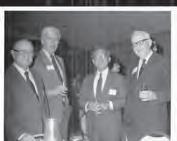


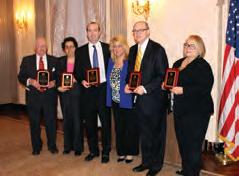




















































































































































































































































2023-2024
The following positions on the Executive Committee of the Association must be filled for the year 2023-2024:
Vice President-at-Large; Vice President, New Castle County; Secretary; Assistant Secretary; Treasurer; Assistant Treasurer; Six Members-at-Large





Note: The Vice President, Kent County and the Vice President, Sussex County will be those persons selected by, respectively, the Kent County Bar Association and the Sussex County Bar Association.
The following positions must be filled for the term as noted:
One (1) DSBA Representative to the Delaware Bar Foundation Board: Four-year term
One (1) DSBA Young Lawyer Delegate to the ABA House of Delegates: Two-year term
The Nominating Committee wants to consider all interested candidates. If you are interested in serving on the Executive Committee or would like to recommend a candidate, please send your name or the candidate’s name along with a CV and at least one letter of nomination to Mark S. Vavala, Executive Director, by email at: mvavala@dsba.org or by mail at: Delaware State Bar Association, 405 North King Street, Suite 100, Wilmington, DE 19801 by February 10, 2023.
The Nominating Committee consists of:
Michael F. McTaggart, Chair Kathleen M. Miller, Vice-Chair
Aaron R. Goldstein (2023)
Achille C. Scache (2023) Kelley M. Huff (2023)
Wilson A. Gualpa (2023)

Christofer C. Johnson (2023)
Brenda James-Roberts (2023) Emily A. Bryant-Álvarez (2024)
Constance A. Dorsney (2024)
LaKresha Roberts Moultrie (2024) Jacqueline A. Rogers (2024) Eric S. Klinger-Wilensky (2024) Srinivas M. Raju (2024) Brandon R. Harper (2024) Sarah T. Andrade (2025)
Barzilai K. Axelrod (2025) Nicholas J. Caggiano, Jr. (2025) Shae L. Chasanov (2025) Thomas H. Kovach (2025) Kathleen A. Murphy (2025) Emilie R. Ninan (2025)
Melissa L. Dill (2023) Keith E. Donovan (2024) Nicole M. Faries (2025)

Stephanie A. Tsantes (2023) Etta R. Mayers (2024) Timothy G. Willard (2025)
Delaware State Bar Association
405 N. King Street, Suite 100 Wilmington, Delaware 19801 (302) 658-5279
The Delaware State Bar Association is looking for a number of talented members to join the
Executive Committee and lead the DSBA to continued success.
WE NEED YOUR HELP TO FIND STRONG LEADERS FOR THE FUTURE!
JANUARY 2023 | VOLUME 46 • NUMBER 6
PRESIDENT

Charles J. Durante
EXECUTIVE DIRECTOR
Mark S. Vavala
EDITORIAL BOARD
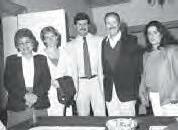

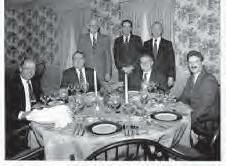
Laina M. Herbert
Jason C. Powell
Kristen S. Swift
Seth L. Thompson
EXECUTIVE COMMITTEE LIAISON
Mary Frances Dugan
EDITORIAL ADVISORY COMMITTEE


Valerie A. Caras
Denise Del Giorno Nordheimer
Adria B. Martinelli
Victoria R. Sweeney
Holly O. Vaughn Wagner
Rebecca Baird
The Bar Journal is published and distributed by the Delaware State Bar Association

405 North King Street, Suite 100 Wilmington, DE 19801

P: 302-658-5279 F: 302-658-5212 www.dsba.org
© Copyright 2023 by the Delaware State Bar Association. All Rights Reserved.

The Bar Journal is the independent journal of the Delaware State Bar Association. It is a forum for the free expression of ideas on the law, the legal profession and the administration of justice. It may publish articles representing unpopular and controversial points of view. Publishing and editorial decisions are based on the quality of writing, the timeliness of the article, and the potential interest to readers, and all articles are subject to limitations of good taste. In every instance, the views expressed are those of the authors, and no endorsement of those views should be inferred, unless specifically identified as the policy of the Delaware State Bar Association.
The Bar Journal is published monthly with a combined July/August issue.
All correspondence regarding circulation, subscriptions, or editorial matters should be mailed to:
Editor, DSBA Bar Journal
Delaware State Bar Association





















405 North King Street, Suite 100 Wilmington, DE 19801 or emailed to: rbaird@dsba.org

Letters to the Editor should pertain to recent articles, columns, or other letters. Unsigned letters are not published. All letters are subject to editing. Send letters to the address above, Attention: Editor, Bar Journal.
Call (302) 658-5279, ext. 102 Email: rbaird@dsba.org
Read The Bar Journal online at www.dsba.org
BY HOLLY O. VAUGHN WAGNER, ESQUIREOne-third of the tripod on which the Delaware Advantage rests is the work of state employees on the ground floor of the Townsend Building. You usually only hear from them when they politely explain a mistake in the document that your office has filed.
From protecting the treasure of Trussum Pond to issuing verified tax refunds, civil service workers protect the public and enhance our lives. They do work that most would prefer to avoid, issuing parking tickets, ministering to the helpless, working 14 hours on Election Day. They guide the perplexed through the courthouse, assist visitors to the library, and sometimes receive grouchy abuse from someone who asserts, “I pay your salary.”
They can also face a more insidious form of abuse, from elements who prefer that they be replaced, their pay slashed, their jobs eliminated. The federal civil service is under quiet attack, one that could have profoundly negative reverberations. Pride in the integrity of a quality civil service is not universal.
In Delaware, bringing merit-based civil service to state government was a key plank of Hal Haskell’s 1964 campaign for governor. Although he was denied the GOP nomination, his proposal was implemented under the administration of Gov. Charles Terry, its design bearing the mark of his young legal aide Bill Quillen, capping two decades of effort by governors of both parties over the resistance of legislators who had jealously guarded their influence over patronage.
The civil service shines nationally in the Delaware Division of Corporations, whose staff examines each filing with the exactitude of an Israeli border guard. Each name, registered address, and statutory reference is examined for accuracy, uniqueness, and compliance with Delaware law. The minuscule error rate is comparable to The New Yorker, a point of pride among staff that is recruited from DelTech and Lake Forest. Unlike states where errant documents receive cursory review, or whose
While Delaware has generally honored the integrity of the civil service since its adoption in 1965, federal public servants have become a target of all three branches.
t urnaround might last weeks, Delaware’s corp orations office treats every filing as carefully as we lawyers should. The process cannot be automated or effectively outsourced. With the Delaware Code and the judiciary, it is the third element of the state’s nationally respected triad.

Like any system that depends on human attention and norms, the civil service needs attention. Delaware was forced to address its commitment last year at this time, when the General Assembly raised pay for state workers at the second most robust level ever, to stem a staff shortage affecting all agencies, including those where human needs are as urgent as UCC filings.
While Delaware has generally honored the integrity of the civil service since its adoption in 1965, federal public servants have become a target of all three branches. The expertise that has been nurtured in the federal service has inspired resentment, and retribution is being readied.
Legislative. When the Budget Analysis Division of the Congressional Budget Office issued revenue projections in 2017 that displeased a congressman from North Carolina, he proposed a legislative rider to eliminate the entire 89-person division. The vote failed, 116-309, but earned the support of over half of his party’s caucus. Civil service protection, you ask? Learn about the Holman Rule. It permits any legislator, during floor debate, to propose reduc-
i
n g an employee’s salary to $1/year or eliminating a specific office. Enacted in 1876, but long abandoned, the rule was revived by the House majority in 2017. By 2019, the rule was rescinded, however it could be revived and might next be used to surgically target specific federal employees, such as an agency whose published research has annoyed moneyed interests.
Executive. The executive branch in October 2020 issued an executive order to create a “Schedule F” that would reclassify up to 50,000 federal workers into at-will employees. These are career employees, not among a president’s 4,000 political appointees. The career employees are part of the federal civil service, protected from discharge without cause, but also prohibited from participating in partisan political activity. Employment decisions in civil service cannot be based on political affiliation. Schedule F would eliminate all of that. If implemented, the
proposal could enable revenge against perceived enemies, insulate presidential allies from investigation, or intimidate government workers into partisan subservience. Ultimately, the initiative was not enacted.
Some administrations have bragged about how many federal employees they could force to resign by making their lives miserable. The Bureau of Land Management was moved from D.C. to Colorado to mollify fossil fuel interests. Divisions of the Department of Agriculture that study climate change, nutrition, and farm economy were moved to Kansas City in order to strip their workforce.
Presidential resentment of the federal workforce, particularly its professionals, has become wilier since President Nixon ordered an examination of the Department of Labor in order to determine how many Jews worked there. There are legitimate fears that a future president
could develop a scheme and use it to sack assistant U.S. attorneys who invest i gate political figures (or decline to do so), revenue agents who audit donors, climatologists who accurately track hurricanes, or economists whose accurate tally of commercial data displeases political strategists — and install pliant functionaries in their place.
Trade journals report that well-funded interest groups are identifying candidates to be removed under Schedule F, which is designed to provide no recourse for appeals. Its implementation would impair the quality of service, regulatory protection, public safety, checks on executive power, and the administration of justice. A mismanaged civil service can lead to a flooded city.
Judicial. A unanimous Supreme Court held in 1984 that courts must defer to an administrative agency’s
J oin the online DSBA Lawyer Referral panel at www.dsba.org.
O pting in is simple and free to all DSBA members.
re asonable interpretation of ambiguous statutes that Congress has assigned the agency to implement. Chevron v. NRDC , 467 U.S. 837. “Judges are not experts in the field, and are not part of either political branch of the Government. Courts must, in some cases, reconcile competing political interests, but not on the basis of the judges’ personal policy preferences,” wrote Justice Stevens. The Chevron principle has been honed, so that it principally applies in cases where there has been formal rule-making or where the agency has expertise in a detailed regulatory scheme.
The Supreme Court recently undercut this principle, without expressly overruling it, holding last June that a “major questions doctrine” permits it to cast aside deference to a regulation that addresses matters of “vast economic and political significance.” Chief Justice Roberts’s opinion held that Congress’ authorization of the EPA to select the “best system of emission reduction” for power plants, did not constitute “clear congressional authorization” for the EPA to promulgate emission guidelines for fossil fuel-fired power plants, designed to increase electricity generation from natural gas plants, reduce use of coalfired power plants, and increase renewable electricity generation. West Virginia v. EPA , 142 S. Ct. 2587 (2022).
If this “major questions doctrine” — which has floated around the academy
for 25 years but was never announced in a Supreme Court majority opinion — sounds to you like an invitation to malleable result-oriented jurisprudence, you’re not alone. “The current Court is textualist only when being so suits it,” Justice Kagan rejoindered in dissent. “When that method would frustrate broader goals, special canons like the ‘major questions doctrine’ magically appear as get-out-of-text-free cards. Today, one of those broader goals makes itself clear: Prevent agencies from doing important work, even though that is what Congress directed.” Slip op., at 54.
The people’s work is carried out not just by those in elected office. Nonpolitical employees of federal, state, and local government are subject to workplace rules and a web of legislative mandates and executive direction. While not policy-makers, they are critical to public service and competent governance. Above all, they deserve respect.
Chuck Durante, the President of the Delaware State Bar Association, is a partner at Connolly Gallagher LLP, fellow of the American College of Trust and Estate Counsel, chair of the Board of Editors of Delaware Lawyer magazine, president of the Delaware Sports Museum and Hall of Fame, trustee of the Delaware Historical Society and president of the Delaware Sportswriters and Broadcasters Association. He can be reached at cdurante@ connollygallagher.com.
The people’s work is carried out not just by those in elected office. Nonpolitical employees of federal, state, and local government are subject to workplace rules and a web of legislative mandates and executive direction.

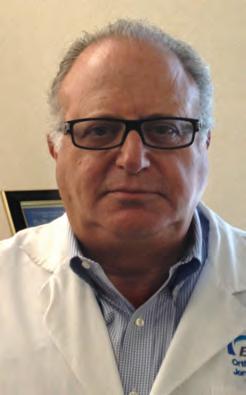



Name several things that existed when you were younger that your children wil l likely not experience in their lifetime. For starters, cassette tapes, Walkmen, pay phones, phone booths,1 landline phones (or at least rotary phones), renting videos from brickand-mortar stores, encyclopedias, 2 and atlases.3 Now think of three things you might have experienced as a Delaware attorney that newer Delaware attorneys will not experience. First, newer Delaware attorneys will not have to bring change to the Leonard L. Williams Justice Center to use the pay phone. Nor will they be required to leave their cell phone rubber-banded to their business card with the U.S. Marshals Service in the U.S. District Court for the District of Delaware. Instead, they may now bring their cell phones into the courtrooms.4 Second, newer Delaware attorneys will not have the pleasure of using a vintage Bates Numbering Machine, or even of applying individual Bates labels to each page of a document. Finally, the Delaware Board of Bar Examiners no longer posts the Delaware bar exam results by secret number on the bulletin board in the law library at the court house.5 Now, aspiring Delaware Bar
admittees may learn their fate — or at least whether they passed the Delaware bar exam — in the comfort and privacy of their own home, office, or wherever they may find themselves on that exciting October day.
While many of us have traded the frustrations associated with cassette tapes getting stuck in our car’s tape deck for a monthly subscription to an
online music streaming service, and now use eDiscovery Review Software to electronically Bates number hundreds of thousands of pages of documents in minutes with a few key strokes, may I suggest at least three aspects of practicing law in Delaware we should retain.
First, the mentoring that occurs between members of the Delaware Bar, whether through a formal mentoring

program or informally, is invaluable, and should not be replaced. According to Ida Abbott, author of books such as The Lawyer’s Guide to Mentoring, Being an Effective Mentor: 101 Practical Strategies for Success, Working with a Mentor: 50 Practical Suggestions for Success, and Mentoring Across Differences: A Guide to Cross-Gender and Cross-Race Mentoring, “[i]n the past, mentoring was seen as a one-on-one process that was long term, top-down, and all-purpose. It was directed primarily at new and junior lawyers and concentrated on their professional learning and development. Today all of those factors have changed[.]”6 According to Abbott, now “[m]entoring relationships are collaborative and less hierarchical. Mentors and mentees learn from each other and sometimes switch roles entirely, with the junior person serving as the mentor and the senior person as the mentee. Some mentors are peers.” 7
In addition, now “[m]entoring focuses on professional advancement as well as professional development and is a careerlong process. Lawyers seek mentors at every stage of their career[.]”8 As Delaware attorneys we are fortunate to have multiple formal mentoring opportunities available to us, including through participating in the various Inns of Court, the DSBA’s Mentoring Program,9 and many informal mentoring opportunities that occur and develop between members of the Delaware Bar. Embrace these opportunities, and look for additional ways to serve as a mentor and as a mentee. Whether you have been the recipient of formal or informal mentoring, it is important to pass along to others the benefits your mentors have given you and become a mentor yourself.10
Second, the importance of a handwritten letter cannot be overstated. Nor can it be replaced by an email. One of my earliest mentors was known for sending handwritten letters. Such a seemingly small gesture can leave a lasting impression on its recipient, and can be more meaningful than formal awards and hard-earned professional accolades.
Third, occasionally pick up the phone and call your co-counsel or opposing counsel rather than sending an email. While you could have relayed the message in a simple email, and yes, saved time with an email, you would have missed out on learning about their daughter’s acceptance into veterinary school, the unexpected passing of their spouse, or their grandchild’s latest misadventure. Indeed, you might also resolve the underlying issue. Again, another lesson learned from one of my mentors in the Delaware Bar.
As we celebrate the DSBA’s 100 Year Anniversary, I encourage you to “nurture and preserve for the future that quality which has made membership in the Delaware Bar so meaningful and special.”11
Bar Journal Content Editor Laina M. Herbert is an associate at Grant & Eisenhofer P.A. in Wilmington, Delaware. She may be reached at lherbert@gelaw.com and additional information about the author is available at www.gelaw.com.
1. AT&T exited the pay phone market in 2007 followed by Verizon in 2011. Reizman, Renée. “What Killed the Pay Phone.” The Atlantic, Feb. 2, 2017. https:// www.theatlantic.com/technology/archive/2017/02/ object-lesson-phone-booth/515385/.
2. “The World Book Encyclopedia is the only general A-Z printed research source still published today.” “The World Book Encyclopedia 2021.” https:// www.worldbook.com/world-book-encyclopedia-2021.aspx.
3. “The online version of the National Atlas (officially known as the 1997-2014 Edition of the National Atlas of the United States) was removed from service in 2014,” although some small-scale datasets are still available on The National Map Downloader and The National Map Services. United States Geological Survey. “Frequently Asked Questions, Since the National Atlas Program has ended, is any data still available?” https://www.usgs.gov/faqs/nationalatlas-program-has-ended-any-data-still-available.
4. Standing Order In re: Possession by attorneys of cell phones, other PDA devices, and laptop computers, D. Del., Sleet, C.J. Nov. 17, 2011. https:// www.ded.uscourts.gov/sites/ded/files/general-orders/Cell-Phone-Use-by-Attorneys_11-01-11.pdf. Security: Prohibition on Cellular Telephones and Other Personal Communication Devices in the New Castle County Courthouse. https://courts.delaware.gov/superior/pdf/cell_policy_NCC.pdf.
5. While not having experienced this myself, I have been told that when you went to check your results, you hoped you passed because if you did not everyone, including law librarian, Rene Yucht, was watching, and your reaction would be enough for people to know immediately what happened.
6. Abbott, Ida O. “Does Mentoring Still Matter?” 5 Prof’l Dev. Consortium Linklettter, at 2. Fall 2018. https://www.pdclegal.org/sites/default/files/linkletter/fall2018linkletter.pdf.
7. Id
8. Id. at 3.
9. For more information on the DSBA Mentoring Program visit DSBA Mentoring Program. https://www. dsba.org/members-area/mentoring/.
10. Abbott, Ida O. “Working with a Mentor: 50 Practical Suggestions for Success.” 2001.
11. Prickett, William. “Post-Admission Mentoring: A Venerable Delaware Tradition.” 19-FALL Del. Law. 16, 20 Fall 2001.
One of my earliest mentors was known for sending handwritten letters. Such a seemingly small gesture can leave a lasting impression on its recipient, and can be more meaningful than formal awards and hard-earned professional accolades.
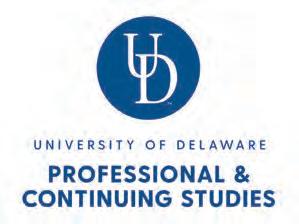
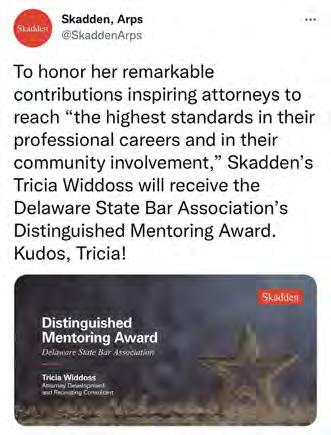
DSBA has partnered with the University of Delaware Paralegal Institute to provide our members with yet another valuable member benefit. Any member or firm is eligible to receive a 15 percent discount on paralegal classes through the UD’s Paralegal Institute. Whether it is new hires seeking accreditation or current paralegals getting some refresher courses, instruction in this important legal area is now possible for a significant discount, all because you belong to DSBA. Led by experienced attorneys, the courses include the annual Paralegal Certificate Program and several Advanced Paralegal Seminar Series courses offered each year. To find out more information, go to the DSBA Member Benefits page https:// www.dsba.org/about-the-dsba/membership/member-benefits/ or to the university’s page at https://www.pcs.udel.edu/paralegal-institute/

Statistically, January and February are the least productive months of the year. The holidays are behind us and cold weather and short days have set in. But there are a few ways to help you be more productive.
Oftentimes, we feel overwhelmed and unproductive because all we can see is the pile of unfinished tasks in front of us. Before you tackle your to-do list, take a moment to think, journal, pray, or meditate so you can organize your thoughts. If you start organizing your tasks with a sense of clarity and purpose, you’ll be much more effective.
Planning your day or your week is an exercise in mental discipline. It requires you to consider what’s most important to you, whether it’s in your work or your personal life, and schedule tasks that reflect those priorities.
If you want to be productive, it’s important to minimize distractions so you can maximize focus. And doing that requires you to set some boundaries. Turn off notifications, log out of social media, and let your coworkers know when you’re unavailable.



Even highly efficient people need help. Delegation can reduce stress and free up mental space so you can put your mind to the tasks that matter most to you.
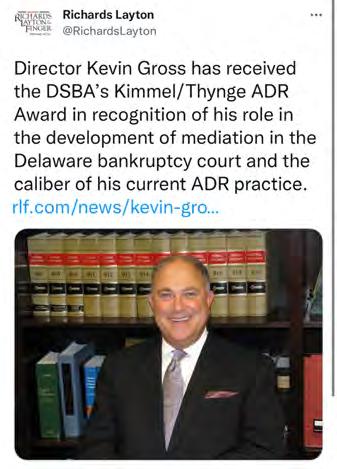
Research shows that people are more productive when they’re happy. Prioritizing some of your own hobbies and interests can refill your tank and help you stay motivated and focused so you do your best work when the time comes.
Source: Daugherty, L. (2022, December 13). Need to get more done? Try these 8 productivity hacks today. CNET, from https://www.cnet.com/health/mental/need-to-get-more-done-try-these-8-productivity-hacks-today/


This committee provides peer counseling and support to lawyers overburdened by personal or practice-related problems. It offers help to lawyers who, during difficult times, may need assistance in meeting law practice demands. The members of this committee, individually or as a team, will help with the time and energy needed to keep a law practice operating smoothly and to protect clients. Call a member if you or someone you know needs assistance.
New Castle County
Karen Ann Jacobs, Esquire, Chair*
Dawn L. Becker, Esquire
John P. Deckers, Esquire
David J.J. Facciolo, Jr., Esquire
David J. Ferry, Jr., Esquire
Robert D. Goldberg, Esquire
Laura Nastase Najemy, Esquire
Denise D. Nordheimer, Esquire
Kuhu Parasrampuria, Esquire
Kenneth M. Roseman, Esquire*
Yvonne Takvorian Saville, Esquire
R. Judson Scaggs, Jr., Esquire*
Victoria R. Sweeney, Esquire
The Hon. Gregory Brian Williams
Lydia E. York, Esquire
Kent and Sussex County
Candace E. Holmes, Esquire, Chair
Crystal L. Carey, Esquire
Edward Curley, Esquire
Clay T. Jester, Esquire
Christopher D. Tease, Esquire
The Hon. William L. Witham, Jr.
Honorary Volunteer Members:
Victor F. Battaglia, Sr., Esquire
Mary C. Boudart, Esquire
Wayne A. Marvel, Esquire
Bayard Marin, Esquire
Michael F. McTaggart, Esquire
Mary E. Sherlock, Esquire**
I. Barry Guerke, Esquire**
Dennis L. Schrader, Esquire**
E. Alan Uebler, Esquire
David A. White, Esquire
Carol P. Waldhauser, Executive Director DSBA/DE-LAP Liaison
Practice Monitor ** Past Co-Chair
Monday, January 16, 2023 • 8:00 a.m. Dr. Martin Luther King, Jr. Breakfast and Statewide Day of Service Chase Center on the Riverfront, Wilmington, DE
Tuesday, January 17, 2023 • 8:30 a.m. – 12:00 p.m. Workers’ Compensation Breakfast Seminar 3.3 hours CLE credit Live Seminar at Riverfront Events
Wednesday, January 18, 2023 • 12:00 p.m. – 1:00 p.m.
Behind the Cool Imagine: Lawyering in the 21st Century: Workshop 3 – Start Now: Personal and Professional Self-Audit 1.0 hour CLE credit in Enhanced Ethics Live Seminar at DSBA with Zoom Option
Friday, February 10, 2023 • TBD Rubenstein-Walsh Seminar on Ethics and Professionalism 2023 TBD Live Seminar at Riverfront Events
Dates, times, and locations of Events and CLEs may occasionally change after time of press. Please consult the DSBA website for the most up-to-date information at www.dsba.org.
www.dsba.org/about-the-dsba/membership.
Tuesday, January 3, 2023 • 3:30 p.m.
Estates and Trusts Section Meeting


Zoom Meeting, see Section listserv message for link and password Tuesday, January 17, 2023 • 12:00 p.m.
Litigation Section Meeting
Delaware State Bar Association, 405 North King Street, Suite 100, Wilmington, DE Wednesday, January 18, 2023 • 9:00 a.m.
ADR Section Meeting
Zoom Meeting, see Section listserv message for link and password Wednesday, January 18, 2023 • 12:30 p.m.
LGBTQ+ Section Meeting Zoom Meeting, see Section listserv message for link and password Thursday, January 19, 2023 • 12:00 p.m.
Executive Committee Meeting
Delaware State Bar Association, 405 North King Street, Suite 100, Wilmington, DE Thursday, January 19, 2023 • 4:00 p.m.
Elder Law Section Meeting
Estate and Elder Law Services of Delaware, P.A., 2961 Centerville Road, Suite 350, Wilmington, DE and Zoom Meeting, see Section listserv message for link and password Friday, January 20, 2023 • 11:30 a.m.
Health Law Section Meeting
Delaware State Bar Association, 405 North King Street, Suite 100, Wilmington, DE and Zoom Meeting, see Section listserv message for link and password Friday, January 20, 2023 • 12:00 p.m.
Workers’ Compensation Section Meeting Zoom Meeting, see Section listserv message for link and password Thursday, January 26, 2023 • 4:00 p.m.

Family Law Section Meeting Zoom Meeting, see Section listserv message for link and password
Refer to the DSBA Section Listserv messages for the most up-to-date information on Section Meetings. Please contact LaTonya Tucker at ltucker@dsba.org or (302) 658-5279 to have your Section or Committee meetings listed in the Bar Journal .
Charles J. Durante President
Kate Harmon President-Elect
Mary Frances Dugan Vice President-at-Large
David A. White
Vice President, New Castle County
Anthony V. Panicola Vice President, Kent County
Alaina M. Chamberlain Vice President, Sussex County
Samuel D. Pratcher III
Vice President, Solo & Small Firms, New Castle County
Jessie R. Benavides
Vice President, Solo & Small Firms, Kent County
Stephen A. Spence
Vice President, Solo & Small Firms, Sussex County
Francis J. Murphy, Jr. Secretary
Mae Oberste Assistant Secretary
Jennifer Ying Treasurer
Ian Connor Bifferato Assistant Treasurer
Kathleen M. Miller Past President
The Honorable Abigail M. LeGrow Judicial Member
Brandon R. Harper Assistant to President
Thomas P. McGonigle Legislative Liaison
Loren R. Barron
Sean Michael Brennecke
Lori A. Brewington
Crystal L. Carey
Paige C. Chapman
Alberto E. Chávez
Joseph D. Farris III
Richard A. Forsten
Katelin A. Morales
Denise Del Giorno Nordheimer
Victoria R. Sweeney Members-at-Large
Mark S. Vavala Executive Director
onnected Technologies” generally refer to products that have internal or built-in technology that allows it to communicate — or connect — with other products, devices, people, etc. in the external environment. This universe of connection may be referred to as the Internet of Things (IoT). The explosion of connected devices in our society, from toasters, refrigerators and doorbells to wearable devices, cell phones and even our cars, has changed the nature of the risks we face and led to data being collected in ways we could not imagine only a few years ago.
Virtually all companies today rely on a vast web of interconnectedness with third party software, suppliers, and services to manage their business, and law firms are no exception. This web creates new attack surfaces that make us vulnerable to cyber-attack. Devices can be lost or stolen, the data on them may be accessed easily, and many use weak or no passwords.
A simple example of a category of connected devices is digital health. This could include smart watches, AI
d iagnostics and analytics, smart pills, telehealth, and devices for remote patient monitoring. A Finnish startup, Oura, designed a ring embedded with biosensors to monitor sleep, heart rate, and body temperature, and the data collected can be quite revealing. Applying an algorithm to Oura user data, a team of researchers at Ohio State were able to identify early warning signs of COVID infection three days in advance of the infection. One significant drawback to digital health is that medical devices are among the most vulnerable to cyberattack. There are billions of such devices, many can be 15-20 years old, IoT creates many access point and the software is not supported. Health data is a principal target of hackers.
Even our cars are connected devices. One vehicle contains over 100 million lines of code, and frequently communicates between components within a vehicle and to the manufacturer through a cell provider. Think about the cars with keyless entry and keyless start that are being stolen by hackers, not to mention the hackers who have taken over vehicle steering and braking systems. Cars are also collecting user data that is shared
with manufacturers, insurers and others with little to no regulatory oversight.
Experts have identified three relevant “attack surfaces:”
▪
The Device Itself: The device may be stolen, its data may be stolen, and various sensors such as the camera and microphone may be surreptitiously activated. In addition, the device itself may be a tool of espionage.
▪
The Operating System: The operating system (OS) may be faulty, preboot Trojans (malware that affects preboot operations) may “jailbreak” its precautions, or it may permit weak passwords.
▪
The External Service Providers: Hackers can also insert malware into Apps so when users download them hackers can access sensitive information, launch man-in-themiddle attacks, and inject new messages between parties.
The law governing connected devices is rapidly evolving. From industry specific guidelines for connected medical devices and autonomous vehicles, to more general standards such as the Internet of
Things Cybersecurity Improvement Act of 2020 (Federal IoT Law) and the California Internet of Things Cybersecurity Improvement Act of 2017, California Civil Code § 1798.91.04 (California IoT Law), state and federal level laws are quickly changing as it relates to IoT standards, introducing new challenges for emerging technologies and new use cases for manufacturers.
In addition to IoT-specific laws and standards, there is a complex matrix of federal and state laws, regulations and industry standards relating to data security and privacy that impact connected devices and the data that they process. Law firms or business owners should manage risk by understanding the role of connected device in the enterprise and throughout the supply chain.
Once the business has a view of its exposure to connected devices, it should review its vendor management program as well as develop a policy governing employee-owned devices that access company data, sometimes referred to as a BYOD (bring your own device) policy. Businesses that rely on vendor software and tech services are particularly vulnerable because most of these products or services require
privileged access to their networks or have access to their most sensitive data.
The vendor management program includes, at a high level, an inventory of all vendors used by the business, a risk assessment of each vendor based on the type of device or services being acquired, a due diligence review of the vendor’s qualifications and reputation, a contract that contains key definitions and important risk allocation provisions, a procedure for monitoring performance during the life of the engagement and a process for off-boarding the vendor at the end of the relationship.
The most important issues to be addressed in contracts typically include ownership of data, confidentiality, representations and warranties, especially regarding infringement and data security, obligations in event of breach, indemnity, insurance and audit rights. More detail can be found in an ABA vendor contracting cybersecurity checklist.1
Here are some tips for creating a BYOD policy:
1Understand the landscape of your device population. What devices will your organization support
and what devices should be allowed to access your data. Will you limit the types of devices you will accept? What types of mobile devices and smartphones do your employees have? This will impact some of the technical specifications your company is able to roll out.
2
Establish a mandatory authorization process. If someone wants to access your network, your organization needs to know about it. Require and plainly state that employees must get permission from IT to obtain remote access to the company’s data.
3 Require encryption or password protection. Require passwords or encryption protection for employees to be able to access company data remotely. If you let employees have remote access to data, this means that other people could potentially get access to the data. From a technical perspective, these protections can look like a password for the entire device, an authentication process for logging into a certain app (likely an email app), or some combination of these factors.
4
Clarify data ownership. An effective policy will identify who owns the data and expressly explain this. This is particularly important in BYOD policies, in which employees are using their own devices, meaning they will likely have personal information on their devices as well as data relating to work. The company must regulate who owns what. If you get into any type of lawsuit where you are collecting data — or even if you have an obligation to preserve that data — the company will only have a right to what is under its “possession, custody or control.”
On the other hand, too much data can lead to more pressures and litigation costs for the company. Consider how much data the company truly wants to hold on to and what might be worth deleting.
existing vendors and customers with confidentiality agreements. Ensure that your company’s BYOD policy is consistent with these agreements and would not jeopardize any relationships.
8 Clearly identify procedure in the event of loss or theft. It’s a great practice to be able to wipe a device in the event of loss or theft to protect your organization from security concerns. However, if you intend to do this, be sure that your organization lets employees know in advance and establishes the proper technological requirements.
5
Limit or explain employees’ expectations of privacy. To avoid invasion of privacy claims down the road, include a clause in your policy that explains employees’ expectation of privacy in the workplace and a stated right that the company can monitor and intercept data and erase it. You should also be mindful of employees’ privacy rights and ensure that you are not infringing on those rights by improperly encroaching into the employees’ personal data on the same device.
9 Obtain employee consent to policy terms. Employers should get employees’ consent to all BYOD policy terms. Ask employees to sign and acknowledge the agreement, so that your organization can have a document it can point to if there’s a dispute or later incident.
10 Draft a written policy. If you choose to have a written BYOD policy, consider separating it from your employee handbook. This will allow your organization to update the policy more readily without having to reissue an entire handbook, as technology changes frequently.
Notes:
Address limits on device use outside of working hours. Make sure you have a clause expressly prohibiting non-exempt employees from performing work while off the clock (e.g., reviewing or answering work emails from home). Work outside these hours can trigger certain payment obligations. Organizations should state in their policy that “off the clock” work is not permitted, condoned or expected — and then ensure that managers are trained on this matter.
1. American Bar Association (ABA) Cybersecurity Legal Task Force. (2021). Retrieved December 19, 2022, from https://www.potteranderson.com/media/publication/941_Vendor%20Contracting%20 Project%20-%20Cybersecurity%20Checklist.pdf
7
Address business-specific privacy issues and compliance with existing policies. Consult with
William R. Denny is Partner and Chair of the Cybersecurity, Privacy and Data Governance Practice at Potter Anderson & Corroon LLP; Certified Information Privacy Professional (CIPP/US) and Certified Information Privacy Manager (CIPM); and past member of the ABA Cyber Security Legal Task Force. He can be reached at wdenny@potteranderson.com.

DSBIS brings decades of risk management experience, a proprietary risk analysis process and a local team supported by the expertise of USI Affinity.
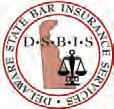



Since 1940, our Wilmington office has provided the insurance solutions and services that lawyers count on to protect their firms, their employees and their families.
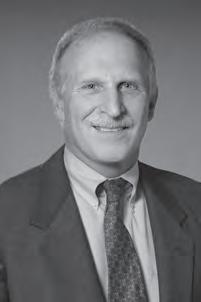

Powered by

 BY MOLLY DIBIANCA, ESQUIRE
BY MOLLY DIBIANCA, ESQUIRE
Email is not new technology, yet it manages to continue to be problematic for lawyers. A recent advisory opinion from the ABA’s Standing Committee on Ethics and Professional Responsibility (the “ABA”) reminds lawyers of some of the most common risks of email use and offers guidance on how those risks can be avoided.
In Formal Opinion 503, issued November 2, 2022 (the “Opinion”), the ABA addressed the use of “Reply All” in electronic communications. Both the Model Rules and the Delaware Rules of Professional Responsibility (the “Rules”) prohibit a lawyer from “communicating” about the scope of the lawyer’s representation with a represented party absent the consent of that person’s lawyer. Specifically, the Opinion looked at whether a lawyer who copies her client on an email to opposing counsel has impliedly consented to the opposing counsel communicating with her client.
The ABA concluded that a lawyer does impliedly consent to her opposing counsel sending a “reply all” response even though that means the opposing counsel would be “communicating” with the sending lawyer’s client. Notably, several states have reached the opposite conclusion, finding that sending lawyers have not implied consented to a reply-all communication with their clients. In departing from those states’ opinions, the ABA’s Opinion relied on several important arguments.
First, Rule 4.2 permits a lawyer to communicate with a represented party where they have the consent of the person’s lawyer. Consent, for the purposes of Rule 4.2, may be implied and need not be express. For example, a lawyer may impliedly consent where the opposing counsel observes the communication and does not object. The email version of this vignette is no different. By choosing to copy her client on an email, the sending lawyer has impliedly consented to her opposing counsel “replying all” to that email. As the ABA explained, the sending lawyer has elected to give opposing counsel the impression that replying to all is permissible (or even encouraged).
Second, the ABA concluded that it was only fair for the initiating party — the “sending lawyer”— to bear the minimal burden of deciding whether to copy their clients. In other words, the sending lawyer is the one who decided to include her client in the communication. Thus, the opposing counsel should not be put in the position of attempting to decide whether the sending lawyer
Specifically, the Opinion looked at whether a lawyer who copies her client on an email to opposing counsel has impliedly consented to the opposing counsel communicating with her client.
has consented to a communication with their client.
Thus, the Opinion concludes, the best practice is not to copy the client on electronic communications with opposing counsel. Instead, lawyers should simply forward the communications to the client after they are sent to the other side. The Opinion specifically warned against the idea of blind copying (bcc’ing) the client because of the risk that the client could “reply all” to the email would still be received by the opposing counsel.
The Opinion goes on to explain that the presumption of implied consent is not absolute. A lawyer who copies their client on an email to opposing counsel can include a clear statement in the email body (not in the disclaimers under the lawyer’s signature block) that the lawyer does not consent to a reply all. The key is to be aware of the possible implications of copying — or blind copying — your client on an email with your adversary.
The Delaware State Bar Association and the Awards Committee are seeking nominations for the Liberty Bell Award, the Community Service Award, and the Myrna L. Rubenstein Professional Support Recognition Award to be presented at the 2023 Law Day Luncheon on May 2, 2023. Below are the criteria for these awards.
The Liberty Bell Award is given annually to an individual, who is not a judge or lawyer, who has rendered outstanding service to his or her community. The award is designed to promote a better understanding of government, a greater respect for the rule of law or a deeper sense of individual responsibility which contribute to the effective functioning of our governmental institutions.
The Community Service Award recognizes annually a member of the judiciary or the Delaware Bar who has rendered meaningful service to the community and who has contributed significant time and effort to the greater Delaware community. Nominees should have demonstrated a commitment to leadership and service in activities that enrich and strengthen our community over a substantial period of time.
MYRNA L. RUBENSTEINThis Award recognizes long and dedicated service to the Bench and Bar of the State of Delaware, to the Bar Association, and to the Members thereof, which has contributed in a significant way to them and to the high ideals of the legal profession.
Nominations should be submitted to Mark S. Vavala, Executive Director, DSBA at mvavala@dsba.org. The deadline for nominations is February 3, 2023. Please include: The name, firm, and title/occupation of the Candidate; name and contact information (firm, address, email, phone, and fax) of the individual nominating the Candidate; and a brief statement of the reasons the Candidate is deserving of the Award.
We begin the new year with the digest of the last two opinions of the Standing Committee on Professional Ethics and Responsibility of the American Bar Association. Both deal with Rule 4.2 issues.
Formal Opinion 502, dated September 28, 2022, is entitled “Communication With a Represented Person by a Pro Se Lawyer.” There are a number of issues that can arise when lawyers represent themselves in legal matters. This ABA Opinion focuses on another Rule 4.2 consideration. Again Rule 4.2 prohibits a lawyer from communicating with a represented person about the subject of the representation if that person is represented by a lawyer. The Committee makes it clear that this Rule applies to attorneys representing themselves as well. Specifically, a lawyer doesn’t stop being a lawyer just because they are acting as a pro se litigant representing themselves in a matter. While the commentary to Rule 4.2 specifically states that parties to a matter may communicate directly with each other, the Committee noted that a pro se lawyer is representing a client even though that client is themself and found that lawyers are no exception to this principle.

It should be noted that the Opinion included a strong dissent. That dissent
Specifically, a lawyer doesn’t stop being a lawyer just because they are acting as a pro se litigant representing themselves in a matter.
conceded that there were strong public policy reasons supporting the majority opinion. However, the dissent focused on the plain language of the rule including the phrase “in representing a client.” The dissenter was unpersuaded that an attorney acting pro se is representing a client when representing themselves or that the Rule gives notice of its application to such a circumstance.
Formal Opinion 503, dated November 2, 2022, is entitled “Reply All” in Electronic Communications. We have all received letters from opposing counsel copied to that counsel’s client. Too often, the target audience of the letter is the sending lawyer’s client and the tone and content of the letter is intended to placate the sender’s client. After receiving such letters, the receiving lawyer may get a phone call from opposing council apologizing for the letter with the explanation that the client insisted that such a harsh or uncivil communication issue.
Additional issues can arise when such a communication is sent by email which
the sending attorney has copied to their c lient. Specifically, is the receiving attorney permitted to respond by “Reply All?” Per Rule 4.2 of the ABA of the Professional Conduct Rules (which tracks Rule 4.2 of the Delaware Professional Conduct Rules), lawyers are prohibited from communicating about the subject of a representation with a represented person absent the consent of that person’s lawyer, unless the law or court order authorized the communication. On the face of the Rule, the receiving attorney’s response by reply all copy to the sending attorney’s client is a communication about the subject of the representation with a representative party.
The committee concluded that when a sending lawyer copies the lawyer’s client on an electronic communication to counsel representing another person in that matter, the lawyer creates a group communication “impliedly consenting” to the receiving counsel’s reply all response to the communication. The opinion goes on to state that lawyers should not copy their clients on electronic communications
to opposing counsel and instead should separately forward these communications to their clients. In the alternative, the ABA suggests that the sending lawyer communicate in advance to receiving counsel that they do not consent to receiving counsel’s use of reply all to override the presumption of implied consent.
“Ethically Speaking” would like to take this opportunity to congratulate the Delaware State Bar Association on its 100th anniversary and to also wish our readers a Happy New Year.
“Ethically Speaking” is intended to stimulate awareness of ethical issues. It is not intended as legal advice nor does it necessarily represent the opinion of the Delaware State Bar Association.
“Ethically Speaking” is available online. Columns from the past five years are available on www. dsba.org.
Charles Slanina is a partner in the firm of Finger & Slanina, LLC. His practice areas include disciplinary defense and consultations on professional responsibility issues. Additional information about the author is available at www. delawgroup.com.
The Editorial Board welcomes submissions from attorneys and other professionals who wish to share their expertise on law-related topics in the DSBA Bar Journal
For information on submitting articles for publication in the Bar Journal, please contact Rebecca Baird at rbaird@dsba.org.
To access the forums, log into www.dsba.org and click on Forums listed at the top of the Members Area page. From there, you will find the list of potential forums. Posting and responding is easy to do. Enjoy connecting!

In January, the common “buzzword” is “change.” Whether it is voluntary or involuntary; small or large; gradual or sudden; retirement and/or passing the torch — change is often on our mind. Most of us are sincere in this goal to break free and achieve change. Some of us are even excited! On the other hand, all too often anxiety and procrastination can, and do, hold us back from realizing our goals.
In leadership, it takes concentration, willpower, and a strategy to embark and stay on a new course. The reason changes are difficult to institute and maintain are that there are so many variables to manipulate. These variables include, among other things, psychological, sociological, and environmental elements, all of which can act as deterrents that often cause procrastination, anxiety, and even failure.
Take, for example, a planned change in leadership. There are hundreds of books offering tips on how to change and how to successfully pass the torch. Yet, while these books and tips can help educate and even inspire, they cannot instill willpower, nor a desire, to effectuate the passing of the torch. Only a leader can. Yes, to break free and realize change, we need to cultivate, not create, the burning desire within to obtain our goal. And be excited about a new chapter.
As a certified international wellness inventory coach and leader of an Employee Assistance Program (EAP), I am familiar with the good, the bad, and the uncertainty of change. After all, I speak and write on the subject. For that reason, I designed, planned, and implemented my own unique blueprint for succession, planning, and retirement at DE-LAP, all with the goal of passing the torch.
When you are an Executive Director of a program, especially one as confidential as DE-LAP, you plan both professionally and personally for the day that you no longer come to the office. At times, procrastination is one’s best friend; but realistically one needs to set into action baby steps to achieve, and not sabotage, the goal.
After one year of planning, designing, and implementing a succession plan, January 31, 2023, will be my last day. The torch will be passed to a new Executive Director. As with any successful change, leadership transition requires careful planning and collaboration, both before and after the transfer of power.
It may be surprising, but many in the legal field, including non-profits, are not prepared for a leadership transition. How much notice should the CEO give the board to begin the hiring process?
In a 2010 blog, Managing Director Jane Howze explains that timing, announcing, and planning for the future are crucial to successful transitions. If the transition period is too short, there is “not enough time to even learn what questions to ask, much less absorb the knowledge necessary for a smooth change.”

Conversely, if the transition drags on for an extended period “executives must continue to find ways to remain relevant to the organization and validate themselves.” Furthermore, where employees look for direction can be unclear when two executives are in the mix. Ms. Howze finds that one to two months is an adequate amount of time for a successful transition. (Bingo — December being filled with holidays and short weeks, it made sense to go into January for my final days.)
While it is important to set up your successor for success, it is just as important to choose the right person to take over the helm. Dan Ciampa, an expert on CEO succession planning, explains that an incumbent executive must use their power to ensure that all functions of the company coincide to acquaint the new executive with the culture and processes of the organization.
Solidifying the steps above, we believe that our goals of a successful transition happened. On December 1,
“To improve is to change; to be perfect is to change often.”
Winston S. Churchill
2022, S cott Godshall, my successor as Executive Director for DE-LAP, was hired and the leadership transition commenced.
On a personal note, I would like to thank you. I appreciate all of you. For the last 17 years, it has been a privilege to be the Executive Director of the Delaware Lawyers Assistance Program and the author of more than 300 DE-LAP Zone articles.
This is not a goodbye, and we will surely meet each other outside the DSBA and DE-LAP. However, a special thank you for making my working days memorable and I will never forget all the memories that we made and stigmas we helped to crush. Important too, and to quote Gloria Steinem:
At my age…people often ask me if I’m ‘passing the torch.’ I explain that I keep my torch, thank you very much — and I’m using it to light the torch of others.

Scott Godshall was in private law practice based in Delaware County, Pennsylvania, representing clients in criminal defense and family law matters. Scott is a Magna Cum Laude graduate of the University of Pennsylvania. Scott’s J.D. was obtained at Columbia University, where he was a Harlan Fiske Stone Scholar and an Articles Editor of the Columbia Law Review. Prior to his private practice, Scott practiced at law firms in Philadelphia and Washington, D.C. Moreover, Scott served as an Assistant U.S. Attorney in the Eastern District of Pennsylvania. Scott served for more than 15 years with Lawyers Concerned for Lawyers – PA (LCL), Pennsylvania’s larger version of DE-LAP. LCL assists attorneys, their families, and law school students dealing with mental health, substance use disorders, death by suicide, and other related issues. Like the Delaware Lawyers Assistance Fund (LAF), Scott was President of the board for the M. Patricia Carroll Fund (MPCF). Formed in 2002 by LCL’s founders, MPCF was organized to play a key role in lawyer rehabilitation, namely, aiding in payment for related expenses.
If you or someone you know would like more information on DE-LAP, please call Scott Godshall, Executive Director of the DE-LAP at (302) 7770124, or email Scott at sgodshall@ de-lap.org and visit the DE-LAP web page at www.de-lap.org.
Carol P. Waldhauser is the Executive Director of the Delaware Lawyers Assistance Program and can be reached at cwaldhauser@de-lap.org.
American Foundation for Suicide Prevention (AFSP), a nonprofit organization based in New York City, is the largest private funder of suicide prevention research in the United States. It raises money primarily through created chapters in all 50 states. Scott has been a volunteer for the Greater Philadelphia Chapter of AFSP since the loss of his son in 2014. He will rotate out of the Chapter board at the conclusion of his fourth year as Board Chair at the end of this year. Scott has personally provided suicide prevention programs throughout Southeastern Pennsylvania.
In leadership, it takes concentration, willpower, and a strategy to embark and stay on a new course.
T his three article series in the “Creating Space in the Law: Leadership, Advocacy & Women” column is authored by Leadership Brand and Career Strategist and Coach Karen Huller. These articles focus on setting professional women up for successful salary negotiations. Part one appeared in the September 2022 issue of the Bar Journal and discussed motivations underlying negotiating pay increases. Part two appeared in the November 2022 issue and discussed actual negotiations methods. This final article will answer some “what if” questions to hopefully prepare the reader to overcome barriers surrounding these conversations.
Now that I have hopefully inspired you to advocate for fair compensation for your worth, and given you the steps to doing so, I should acknowledge that there are so many different scenarios that can happen. While I cannot cover them all in this three-article series, I would like to address the most common and current “what ifs.”

In the efforts to close wage gaps, some municipalities and state governments have made this question illegal. Delaware was actually a forerunner of such efforts and this question has been illegal since 2017.1 It would not be a good sign if your prospective employer, especially a law firm, was unaware of this law. However, you may be pursuing work in a different location. Be sure to familiarize yourself with
conditions.
t he local laws where you are applying on whether employers may ask about your salary history.

Pay transparency laws are another effort states have made to close wage gaps and promote pay equity. New York City just passed one such law that requires most employers to list a “reasonable minimum and maximum” pay range with each job posting. Though this type of law is still in early adoption, some companies have voluntarily posted pay ranges to prevent wasted time in the recruiting cycle. If you see a position posted with ranges and the positions are not in New York City, it will be harder to know if they are “reasonable,” but companies with robust Human Resources departments often have a compensation analyst(s) responsible for validating market pay, and they work in concert with the finance department to reconcile the market with their budget. The previous article has already taught you to validate your own market range. If you find that your market value exceeds a company’s posted range and the position is worth pursuing otherwise, I advise you to investigate further, which may mean applying, or, better yet, reaching out to a hiring manager. If HR and Finance have come up with numbers that are not serving recruitment efforts, the hiring manager may find your research and data to be very helpful in their advocacy for better pay, and therefore higher caliber talent. This is a “help me understand” scenario.
To further explain a “help me understand” scenario: The Vice President of Sales at my former recruitment firm was keen on personal and professional development. He would adopt and teach us catch phrases that helped us facilitate better collaboration with our clients, the employers,
and our product, the candidates. “Help me understand” became an inside joke, as he used it very often. When I used it on him to increase my own salary 50 percent it became less of a joke and more of a miracle. This non-confrontational question can convert what can be an adversarial inquiry into a point of curiosity. There are many “what ifs” in compensation negotiation that are best addressed by this question.
When you and the employer’s ranges do not align is one such scenario.
Others include: When there is rigidity on paid time off or other benefits, when an employer lacks reporting flexibility and you can work more efficiently at home, when sick time is accrued, e.g. help me understand what your employees do when they get sick before they have accrued sick time.
Ultimately, it’s up to you to decide if the reasons you are given make sense and are acceptable to you. If the answer is “I don’t know,” the follow up questions is, “Can you please find out for me?”
If you consistently find that the pay ranges posted exceed your range, you may have skipped or have to re-do validation. In these times of accelerated change, the market may have moved and you may have missed it. Repeat the competitive compensation analysis I recommended in Step Two of article two in this series.
WHAT IF: I AM ASKED FOR MY SALARY REQUIREMENTS BEFORE I HAVE THE CHANCE TO DEMONSTRATE MY VALUE?
Deliver it. “Based on my research and the value I offer by [insert unique value propositions and expected outcomes you can prove you deliver], my expected range is XXX,XXX – XXX,XXX. Does that align with the budget for this position?”
This might preclude you from consideration, but if your range is validated by accurate market analysis, then you will be
able to find other opportunities that pay what you ask.
If there is something about a position that makes you want to pursue it in spite of however short it falls on your salary requirements, at least make sure that the salary will meet your current lifestyle needs (I recommend checking with your financial advisor) or that you are willing to sacrifice parts of your lifestyle, that there are opportunities to grow into your salary requirements, and that the benefits offered have a monetary value that makes up for the lack of cash flow.
In fact, benefits are sometimes more negotiable than salary in some companies. You may be able remove some large expenses by securing a company car, joining the onsite gym, taking advantage of on-site daycare, or travel per diems and discounts on services you will use regularly that add up, like dry cleaning or entertainment.
You are already a persuasive negotiator. I hope this article series has helped you better apply some of what you already knew to advocate for better compensation and conditions. Like anything new, it will feel uncomfortable to put into practice. And as with all things, the more you practice, the better you get. Also, the more individuals like you advocate for yourself, the easier you make it for others to follow in your footsteps, and the faster we can close wage gaps.
Notes:
1. Morris, Duane. “Delaware Enacts Pay History Ban.” SHRM. SHRM, October 29, 2019. https:// www.shrm.org/resourcesandtools/legal-and-compliance/state-and-local-updates/pages/delawareenacts-pay-history-ban.aspx.
Karen Huller is CEO of Epic Careering, the cofounder of The Consciousness Conference (ConCon) and the C3: Corporate Consciousness Co-op community on LinkedIn. She is the creator of the Corporate Consciousness Ripple Blueprint and author of Laser-sharp Career Focus: Pinpoint your Purpose and Passion in 30 Days . She founded Epic Careering, a conscious career and leadership development firm specializing in executive branding, talent-values alignment, and conscious culture, in 2006. She can be reached at karen@epiccareering.com.
I hope this article series has helped you better apply some of what you already knew to advocate for better compensation and
In Delaware, assignments for the benefit of creditors (ABCs) have gained popularity in recent years as a cost-effective alternative to bankruptcy proceedings for distressed mid-size and small businesses. But what exactly are ABCs? And, importantly, what are the Delaware Court of Chancery’s expectations of an assignee and its counsel in connection with such proceedings?

ABCs are an ancient insolvency mechanism, rooted in the common-law principle that property in the hands of an assignee is not subject to attachment by creditors of the assignor. In an ABC, a debtor-assignor makes a general assignment of its assets to another person, in trust, for the benefit of the debtor-assignor’s creditors. This ensures that creditors of like priority will receive a ratable distribution from the assets, instead of the assets going to the creditor who wins the “race to the courthouse” and executes on its judgment.
In many jurisdictions, ABCs have a statute that supplements the common law. Delaware’s ABC statute is codified at 10 Del. C. §§ 7381 through 7386, which was enacted in 1875 and, with a few amendments, remains in its original form today. The Delaware statute requires the assignee to file an inventory of the assignment estate with the Court of Chancery, obtain an appraisal of the estate, post a bond in an amount and form approved by the court, and render periodic accountings, the last of which is subject to approval by the court upon notice to creditors. This process is generally similar to the administration of a decedent’s estate — compare, e.g., 12 Del. C. § 1905 (inventory and appraisal), § 2301 (rendering of accounts), and § 2713 (posting of bond) — but with a sparser statutory framework. As in a decedent’s estate, the Court of Chancery’s role in an ABC is largely one of fiduciary oversight (i.e., exercising in personam jurisdiction over the assignee), rather than management (i.e., exercising in rem jurisdiction over the assets).1
A bankruptcy proceeding, by contrast, is governed by federal statutory law, vests exclusive in rem jurisdiction over the bankrupt’s assets in the bankruptcy estate, and protects those assets from creditors’ attachments by a statutory injunction (the automatic stay of 11 U.S.C. § 362). The assets are managed by a fiduciary (in a chapter 7 c ase,
t rustee; in a chapter 11 case, typically the debtor itself), but the Bankruptcy Code restricts their disposition — including, in many instances, by requiring bankruptcy court approval. For this reason, chapter 11 proceedings often begin with an expedited “first-day” hearing, and accompanying pleadings and affidavits, so the debtor can obtain authority for immediate dispositions necessary for it to continue to operate its business.
In sum, while ABCs and bankruptcy proceedings are both insolvency mechanisms, they are vastly different, both in nature and in operation.
The Court of Chancery has limited fiduciary oversight role of ABCs under the statute. This, combined with the lack of procedural rules or standing orders and little case law precedent, results in limited guidance for ABC practice.
However, recent remarks made by various Vice Chancellors in written opinions (or orders), bench rulings, and panel discussions signal that the Court has increased scrutiny and is expecting more of counsel in ABCs. Vice Chancellor Laster in In the Matter of Global Safety Labs, Inc. reviewed the court filings and recommended more detail “about the entity, its history, the path that led to the relief sought and the parties who could be affected by the relief” sought from the court.2 Of primary concern was that “[m]any of these proceedings are handled ex parte, so the court never has the benefit of an interested party that can provide a different perspective or ask probing questions.” Confronted with a “bare-bones four-page document consisting principally of conclusory averments,” the court observed that the ABC petition was not “an outlier” — but was “representative of petitions that the court sees regularly in cases involving defunct and dissolved entities and in [ABC] proceedings.” While “not trying to convert a Court of Chancery proceeding involving a defunct or dissolved entity into a bankruptcy case,” the court noted that “[a] first-day declaration in a bankruptcy proceeding provides a helpful model” for the kind of disclosures that would assist the court in evaluating ABC petitions.3
Vice Chancellor Fioravanti appears to concur, though it is unclear whether he would require the detail of a “first-day” declaration. In In re
Kidbox.com, Inc., the assignee requested a stay of collection efforts without providing background facts to support the request.4 The court noted that “[i]n ex parte matters such as this ‘counsel have a heightened obligation to provide information to the court.’ The petition and letter to the court do not provide any information supporting the entry of a stay.” Similarly, in In re Ohana Biosciences, Inc., at a hearing on the assignee’s final accounting, the court took issue with an interim distribution the assignee had made without prior notice to the court and the lack of disclosure regarding the relationship among the purchaser of the assignor’s assets, the secured lender, and the assignee. While the court was ultimately satisfied with further representations on the record (followed by filed supplemental affidavits), it emphasized the heightened obligation of counsel “to provide information to the Court in these ex parte matters. And my view is that more transparency is better.”
Vice Chancellor Zurn has expressed similar concerns, noting in a November 17, 2022 panel discussion at the Delaware Views from the Bench that the level of disclosure that is customary in chapter 11 “first-day” declarations might provide a standard for ABCs.5
The most effective way to create consistency, predictability, and conformity in ABC proceedings may be for the Court of Chancery to formally promulgate procedural rules, or individual chambers procedures, governing ABC proceedings. If it does so, we submit it should give careful consideration to the cost considerations that lead companies to choose an ABC proceeding over a more involved (and expensive) bankruptcy proceeding. If requirements akin to those in chapter 11 bankruptcy proceedings were imposed on assignees, at least one major benefit of an ABC — its costeffectiveness — could be seriously undermined.
1. For a more detailed discussion of the ABC process in Delaware, see Patrick A. Jackson and Ian J. Bambrick, Assignments for the Benefit of Creditors: Delaware, Practical Law State Q&A w-030-2647.
2. Case No. 2022-0309-JTL, 2022 WL 1493324, at *1 (Del. Ch. May 12, 2022).
3. A “first-day” declaration is customarily filed in a large chapter 11 bankruptcy case, included to support “first day” relief at a hearing held within a day or two after the filing. In it, the debtor describes its company history, corporate and capital structure, financial background, reasons for the filing, and goals in connection with the chapter 11 bankruptcy proceedings. Such a declaration is not submitted in a chapter 7 liquidation proceeding, and may not be submitted in a smaller chapter 11 proceeding or where no expedited relief is sought.
4. In re Kidbox.com, Inc., C.A. No. 2022-0379-PAF (Del. Ch. 2022).
5. In re Ohana Biosciences, Inc., C.A. No. 2021-0515-PAF (Del. Ch. 2022).
Patrick A. Jackson is a partner at Faegre Drinker Biddle & Reath LLP in Wilmington, Delaware, where he focuses his practice on restructuring and insolvency matters, and related litigation in federal and state courts. He can be reached at patrick.jackson@faegredrinker.com

Katharina Earle is an associate attorney at Faegre Drinker Biddle & Reath LLP in Wilmington, Delaware, where she focuses her practice primarily on corporate restructurings, bankruptcy, and other insolvency-related matters. She can be reached at katharina.earle@faegredrinker.com.

Wednesday, December 7, 2022 | Riverfront Events, Wilmington, DE
The Annual Awards Luncheon was held at Riverfront Events on December 7, 2022 where over 100 people celebrated the award presentations. Congratulations to all the award recipients!







Schoenbeck Ostroski (L ) 8. Daniel L.
recipient
Esquire, of Wilson Sonsini Goodrich & Rosati (L) with presenter The Honorable Sam Glasscock III (R).










On Saturday, December 3, DSBA held its third annual (the first since 2019!) “Breakfast with Santa.” The DSBA staff trans formed the upstairs conference rooms into a winter won derland where DSBA Members and their families enjoyed a delicious breakfast, a holiday craft, and, most importantly, a chance to sit beside an authentic and judicial St. Nick. DSBA provided photos with Santa to those in attendance and everyone who attended seemed genu inely merry. Thank you to The Honorable James G. McGiffin, Jr. and our event sponsors for helping to make this event truly magical.
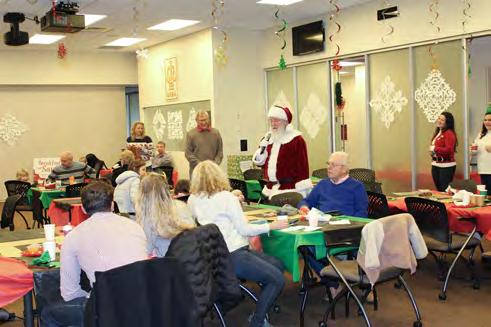


There, on the thin velum paper of those first minutes, is an affirmation that all three counties were committed in developing a single voice for lawyers throughout the state.
In the late nineteenth century, there was a scramble to incorporate bar associations all across the country.1 The American Bar Association, founded in 1878, became increasingly active in reforming the legal system in America, often supporting conservative initiatives to curb the growth of corporate power and reforms which favored the judiciary over federal legislatures. 2
By 1890, 32 state bar associations had been incorporated. 3 Delaware joined the frenzy in 1901, adopting bylaws in Dover and printing a small booklet in commemoration of the event and the only evidence pointing to the 1901 incorporation. However, once this rush to incorporate prompted by the ABA ended, no further written records, newspaper clippings, or other physical evidence between 1901 and 1923 provide any insight as to what happened after this initial formation of the Bar Association. It seems Delaware decided to evaluate the prudence of a statewide association and develop one after more careful consideration.
A statewide association is not mentioned again until 1922, when Josiah Marvel returned from an ABA meeting and suggested that the New Castle County Bar develop a committee for reorganizing the State Bar Association. That committee met on January 25, 1923 and included three members from New Castle County and three from Kent County. In addition, Andrew J. Lynch of Georgetown attended the meeting. They unanimously voted to rekindle what was first formed in 1901. In the minutes of the February 21, 2023 meeting of the New Castle County Bar Association, the opening statement no longer referred to the association as a county bar, but as “a meeting of the members of the Bar of Delaware.” Those minutes began with an affirmation that all three county Bar Associations, the New Castle, Kent, and Sussex Bar Associations, moved “for the reorganization of the State
Bar Association.” There, on the thin velum paper of those first minutes, is an affirmation that all three counties were committed in developing a single voice for lawyers throughout the state.
Those first minutes of the Association are a Who’s Who of Delaware legal history. The Chair of the Bylaws Committee, Robert H. Richards, submitted for approval the renewed Association bylaws which were amended versions of the 1901 rules. Chairman of the American Citizenship Committee, District Judge Hugh M. Morris, presented a report from that committee. The first officers were elected, including Josiah Marvel as President, John Biggs as First Vice President, Henry Ridgely as Second Vice President, Charles Cullen as Third Vice President, Thomas Frame as Treasurer, and Leonard Wales as Secretary. The first order of business was to create the Special Committee on Ethics.
In the early years of the DSBA, the minutes are punctuated by the presence of Delaware legal royalty. Woolley. Wolcott. Melson. Townsend. Morris. Ward. Gray. Redding. These pioneers, the founders of the Association, set forth in motion an organization dedicated to furthering the legal practice in Delaware, seeing a unified and powerful response to the issues facing attorney members, and the development of laws and rules to protect its citizens.
1. Hylton, J. Gordon, The Bar Association Movement in Nineteenth Century, Marquette Law Review , Vol. 81, Issue 4 Summmer 1998, Art. 7, Vol. 81, 1028.
2. Matzko, John Austin, The Early Years of the American Bar Association, 1878-1928 (A Dissertation Presented to the Graduate Faculty of the University of Virginia in Candidacy for the Degree of Doctor of Philosophy, University of Va. 1984), iii.
3. Pound, Roscoe, The Lawyer from Antiquity to Modern Times , 1953 at 275.
The Bar Association is honored with the Army-Navy-Coast Guard Award for its legal assistance to members of the armed forces.
On February 21, 1923 the Delaware State Bar Association reorganizes with the first meeting taking place on February 21, 1923 in Wilmington to elect officers and pass bylaws.
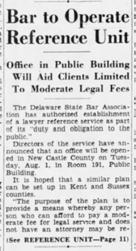

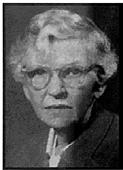
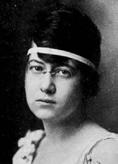

Legal Aid Society is created by the Bar Association to assist in representation for citizens who cannot afford an attorney.
Josiah Marvel becomes the first President of the Bar Association for a two-year term.
Sybil Ward and Evangelyn Barsky become the first two women admitted to the Delaware Bar.
The Bar Association holds a special meeting endorses the repeal of the 18th Amendment, taking an unusual stand on a controversial issue, the repeal of Prohibition.
The Bar Association finds a home in the Equitable Building in Wilmington remodeled into Market Tower.

The Bar Association organizes a scrap metal drive to support the American effort in World War II.
Louis L. Redding becomes the first Black member of the Delaware Bar.
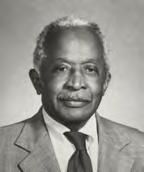
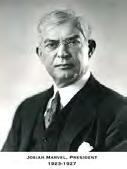
The Bar Association develops the Lawyers Reference Service, a low or limited fee service for middle income citizens in Delaware.
The Bar Association is named the “best small state bar association in the country by the American Bar Association, saying Delaware “put to shame the activities of many of the larger bar associations.”
William Prickett hosts members of the Bar Association at his home in 1945, a precursor of today’s Bench and Bar Conference.
The Bar Association establishes quarters at the Rodney Hotel on a trial basis and later moves meetings to the foyer at the Hotel du Pont in 1958.

The Bar Association is invited to be part of the Public Building (now Young Conaway Stargatt & Taylor).

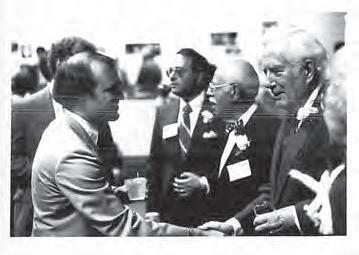

Bar Association Special Committee on Women’s Rights is created.
The Delaware Bar Foundation is established.
Continuing Legal Education Committee established.
The Bar Association moves to various suites in the Market Tower Building.
The Bar Association’s Corporation Law Committee urges modernization of Delaware Corporation Law.
1974 1978 1970 1970
The first issues of The Newsletter published and the Delaware Legal Directory are published.
In 1970, the Certificate of Incorporation is filed with Secretary of State.

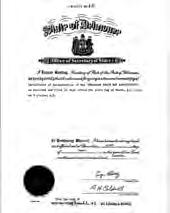
1977
Charles R. Harris, Esquire is named the first executive director of the DSBA and serves until 1984. The subsequent executive directors are: William L. Wiggin, Esquire (1984-1991), Rina Marks (1991-2015), Johnna M. Darby, Esquire (2015-2016), and Mark S. Vavala,Esquire (2016 – present).
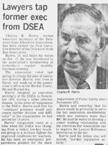
1981 1985
1982 1986
The Bar Association hosts Chief Justice Warren Berger at the Bench and Bar.
The Bar Association begins a two-year residency at 708 Market Street Mall.
The State evicts the Bar Association from Public Building; new home becomes the Carvel State Office Building.

Over 200 runners participate in the inaugural Race Judicata in Wilmington.
1976 1976 1963 1980 1987
The first issue of “IN RE:” published.
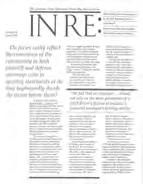
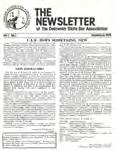
The first volume of Delaware Law Review is published.
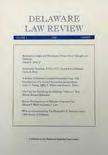
The Bar Association offices move to Legal Arts Building.
The First Annual Women and the Law Section Retreat is held.
The Women and the Law Section creates the Roxana C. Arsht Fellowship.
Delaware State Bar Insurance Services Inc. (“DSBIS”) is created by Charles S. McDowell and Michael Parkowski as a vehicle to generate nondues revenue for the Association.
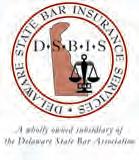
The Delaware Lawyers Assistance Program created with Carol Waldhauser as Executive Director.

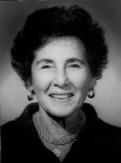
DSBA’s Multicultural Judges and Lawyers Section holds the first Minority Job Fair, assisting young lawyers of color in gaining employment opportunities.
The Bar Association moves to One Commerce Center, 1201 N. Orange Street.

The DSBA completes the purchase of the former Farmers Bank building at Third and Market Streets in Wilmington – in close proximity to the new Justice Center.


The Senior Lawyers Committee, headed by Dan Kristol, commenced an Oral History Project, to be coordinated with the DSBA Bar History Committee.

The Delaware State Bar Association and the Delaware Bar Foundation co-sponsor the first annual Office and Trial CLE Seminar.
Robert B. Young, Esquire, then-President of DSBA writes, produces and performs a musical for the benefit of the Combined Campaign for Justice.
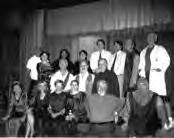
The Bar Association Co-Sponsors the National Mock Trial Competition held in Wilmington.

DSBA hosts first Wills for Seniors Event, spearheaded by the Multicultural Judges and Lawyers Section.

DSBA moves to its current location in the Renaissance Centre, 405 North King Street.

DSBA launched the Legal Directory App.

DSBA’s Corporate Law Section Co-Sponsors the Anniversary Symposium, celebrating the 225th anniversary of the establishment of the Delaware Court of Chancery; the 50th anniversary of the 1967 general revision of the Delaware General Corporation Law; and the 25th anniversary of the Delaware Limited Liability Company Act.
The Bar Association creates the Online Mentoring System to connect Mentors and Mentees.

The Bar Association supports its members during the COVID-19 pandemic by offering quality online CLE, support services through DE-LAP, outdoor social events, and up-to-date resources for attorneys and judges to navigate new rules and procedures.
The Executive Committee of the Bar Association votes to support initiatives to revamp the Delaware Bar Exam in order to make the exam more accessible.
The first Dr. Martin Luther King, Jr. Breakfast and Day of Service is held at the Chase Center.

DSBA hosts the First Small Firms and Solo Practitioners Conference.
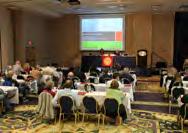


The Bar Association launches the Online Referral System.
The Women and the Law Section Celebrates 95 Years of Women in the Delaware Bar with a trip to D.C. with special guest Supreme Court Justice Ruth Bader Ginsburg.
The Bar Association reorganizes the Diversity Committee to the Diversity, Equity and Inclusion Committee and creates of the Diversity Clerkship Program.
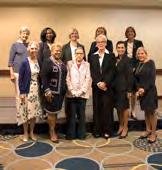
Holly Vaughn Wagner is Deputy Director for the Division of Research, where she drafts legislation, researches policy matters, and promotes Oxford comma awareness. She can be reached at Holly.Vaughn_ Wagner@ delaware.gov.

For those of us working in or with the legislative branch, January 2023 will hum with the fervent energy of the new 152nd General Assembly starting its two-year term. While most are looking forward to the work to be done, the Division of Research is looking back at legislation from the 151st General Assembly. We hope that by pulling into focus the hot topic issues before the 151st General Assembly, we can help predict and prepare for the issues that will continue to be significant to Delawareans during the 152nd General Assembly’s sessions in 2023 and 2024.
Beyond the legislature, changes to Delaware laws are, of course, important for attorneys and others in the legal field. The 151st General Assembly introduced 1,678 pieces of legislation in 2021 and 2022; that is a lot of law to keep up with. This article is not – and could not be – a comprehensive list of topics addressed by the 151st General Assembly. Nor is it an in-depth analysis of any bill. Rather, this article is a snapshot of the work that was done. Readers should review the bills themselves for a full understanding of the law.
C riminal Justice
HB 115 set the minimum age at which a child may be prosecuted and prohibited t he prosecution of children under the age of 12. HB 115 barred the transfer of juvenile prosecution to the Superior Court unless the child is 16 years or older, with exceptions for only the most serious offenses.
HB 195 required certain police officers and employees of the Department of C orrection and Department of Services for Children, Youth, and Their Families to wear a body worn camera and use the camera to record interactions with a member of the public.
HB 215 adopted the Uniform Electronic Recordation of Custodial Interrogations A ct, which mandates electronic recording of the custodial interrogations by law enforcement when the interrogation relates to a crime allegedly committed by an adult or a delinquent act allegedly committed by a child. Whether the recording must be audio or audio and video depends on the location of the custodial interrogation.
HB 243 prohibited law-enforcement agencies from releasing or publishing the name of a juvenile or an image depicting a juvenile unless the juvenile is charged with a violent felony and the release or publication of the photograph is necessary to protect the public’s safety.
Expungements were the subject of both SB 111, which required the State Bureau of Identification to identify and expunge c ases eligible for automatic mandatory expungement on a monthly basis, and SB 112 , which expanded eligibility for mandatory expungement of adult and juvenile cases.
SB 148 expanded the Division of Civil Rights and Public Trust’s responsibility
to review deadly use of force incidents by law enforcement, by adding review of cases involving serious physical injury.
SB 148 also required that, if the Division issues a public report on the use of force, the report must include the race of the law enforcement officer who used force, the race of the individual on whom force was used, and whether race was a relevant or motivating factor.
HB 173 allowed the preliminary enrollment of a military-connected student by remote registration in a school where the student’s parent or guardian is in active U.S. military or in full-time status during active service with the Delaware National Guard.
HB 175 allowed one excused absence per school year for students grades 6 t hrough 12 to attend civic engagements.
HB 301 required the Department of Education to establish and implement s tatewide mental health educational programs for each grade in each school district and charter school in Delaware.
HB 430 created a statewide Grow Your Own Educator Program to improve recruitment, retention, and diversity of educators in Delaware public schools.
HB 480 made several changes relating to financial assistance for education, to promote and support the state’s high demand career fields and reduce student debt for Delaware residents.
SB 12 expanded the Delaware Student Excellence Equals Degree Act to adult D elaware residents who are not recent high school graduates.
SB 13 created a “Ban the Box” policy for postsecondary institutions in Delaware, regarding the removal of questions
Click on any of the text in bold to view the full text of the referenced Bill at https:// legis.delaware.gov/ or to view the referenced case on LexisNexis.
about one’s criminal conviction history on a college or job application.
Under SB 125, the spouse or child of a member of the active U.S. military s ervice who has been assigned to duty elsewhere immediately following assignment to duty in Delaware is deemed an in-state resident for determining tuition, fees, and other charges at Delaware public universities, colleges, or community colleges.
HS 1 to HB 25 provided for election day registration for presidential primary, primary, special, and general elections. HS 1 to HB 25 was enacted into law in July 2022; the Delaware Supreme Court held same-day registration as established in HS 1 to HB 25 unconstitutional in Albence v. Higgin , 2022 Del. LEXIS 377 (Dec. 13, 2022).
HB 183 created a process for the Comm issioner of Elections to determine if a candidate or an incumbent elected official for a state or county elected office is a resident of the district or area they represent or seek to represent.
Campaign finance and reporting were addressed in several bills. SB 176 related to penalties and other consequences of failing to meet campaign finance reports requirements. SB 177 related to the threshold for requiring candidate comm ittees, deadlines for campaign finance reports, and the date by which a candidate must withdraw to be removed from
the general ballot. SB 178, which did not pass the General Assembly, related to loans and contributions to political committees.
SB 320 established voting by mail in Delaware. SB 320 was enacted into law in July 2022; the Delaware Supreme Court held voting by mail as established in SB 320 unconstitutional in Albence v. Higgin, 2022 Del. LEXIS 377 (Dec. 13, 2022).
HB 19 defined “electric bicycles” and establishes how they may be operated in Delaware.
HB 212 provided a phased-in approach to further the reduction of single-use plastic bags by increasing the minimum thickness for a plastic bag to qualify as a reusable bag.
SB 21 amended the Delaware Energy Act to encourage the adoption of electric vehicles by creating more accessible electric vehicle charging infrastructure.
SB 54 amended the Delaware Voluntary Clean Energy Financing Program Based on Property Assessments (D-PACE) Act by clarifying the interplay between the Act and existing tax and foreclosure sale statutes and that the lien for the energy improvements remains with the property following a tax monition sale and mortgage foreclosure. SB 54 also clarified the authority of the Sustainable Energy Utility and third-party capital providers to enforce the lien for delinquent assessments for clean energy improvements.
SS 1 to SB 187 required municipalities with a population of 30,000 or more to develop a procedure to obtain permission
for the installation of an electric vehicle charging station on real property zoned for residential use that abuts a residential street.
SB 298 related to regulations promulg ated by the Public Service Commission, municipal electric companies, and electric cooperatives on the subject of net energy metering, including increasing the cap at which electric utilities may elect not to provide net metering services; providing that net metering rules and regulations must consider the reliability, safety, and capacity of the affected electric distribution system; and addressing provisions for adding new meters to maintain system safety and reliability.
HB 124 prohibited a person who is the subject of a Protection from Abuse Order f rom purchasing, owning, possessing, or controlling a deadly weapon or ammunition for a firearm. HB 124 also prohibited the subject of an outstanding arrest warrant or active indictment or information related to a crime of domestic violence from purchasing a firearm.
HB 125 established the crimes of possession of an unfinished firearm frame or receiver with no serial number, possession of and manufacturing a covert or undetectable firearm, possession of and manufacturing an untraceable firearm, and manufacturing or distributing a firearm using a three-dimensional printer.
HB 125 also established the crime of possession of a firearm frame or receiver with a removed, obliterated, or altered serial number.
HB 423 created the Firearm Transact ion Approval Program (FTAP) within the State Bureau of Identification and designated FTAP as the point of contact between a federal firearms licensee and the federal databases checked by the Federal Bureau of Investigation for purposes
of conducting background checks for firearm purchases or transfers.
HB 450 prohibited the manufacture, sale, offer to sell, transfer, purchase, rec eipt, possession, or transport of assault weapons in Delaware, subject to specified exceptions, including exceptions relating to law enforcement or military personnel and the transfer to family members through inheritance or otherwise.
HB 451 raised the age to purchase most firearms from 18 to 21, with exceptions.
SS 1 to SB 6 prohibited the manufacture, sale, offer for sale, purchase, receipt, t ransfer, or possession of a large-capacity magazine. And, SB 323 excludes a person who manufactures a large-capacity magazine if the person does so with the intent to sell the large-capacity magazine to a person outside of Delaware.
SB 8 defined “machine gun” as it is def ined under federal law, thereby clarifying the types of weapons prohibited under Delaware law. SB 8 also prohibited a person from making a destructive weapon, including a machine gun, and the manufacture, sale, transfer, purchase, or receipt of a rapid-fire device.
SB 302 established that a firearm industry member may not knowingly or recklessly create, maintain, or contribute to a public nuisance through the sale, manufacturing, importing, or marketing of a firearm-related product, and that a firearm industry member’s conduct constitutes a proximate cause of the public nuisance if the harm to the public is a reasonably foreseeable effect of the conduct, notwithstanding any intervening actions, including criminal actions by third parties.
HB 241 permitted an officer to refer a juvenile who is in possession of alcohol or
marijuana to the Juvenile Civil Citation Program rather than issue an assessment for a monetary civil penalty. HB 241 also removed a provision requiring monetary marijuana penalties to double if unpaid within 90 days.
HB 276, which ultimately was not enacted, clarified that an individual who is a registered qualifying patient under the Delaware Medical Marijuana Act is not disqualified under Delaware law from possessing a firearm, if the individual is not a person prohibited. HB 276 also clarified that a registered qualifying patient may engage in a firearm transaction between unlicensed persons if the transaction is exempt under Delaware law and the registered qualifying patient is not otherwise a person prohibited. HB 276 was passed by the General Assembly but was vetoed by Governor Carney in October 2022.
The 151st General Assembly considered multiple approaches relating to marijuana for recreational use. None, however, were ultimately enacted into law. HB 305, which would have created a path for the regulation and taxation of marijuana in the same manner as alcohol, was defeated in the House. The effort to regulate and tax recreational marijuana was presented again through HB 372 , also defeated in the House. The subject of H B 371 was decriminalization and would have removed penalties for possession of 1 ounce or less of marijuana, except for those who are under 21 years old. HB 371 passed the General Assembly but was vetoed by Governor Carney in May 2022.
SB 60 allowed nurse practitioners, physician assistants, pediatric psychiatrists, and developmental pediatricians to recommend medical marijuana for adult or pediatric patients.
SB 280 required medical marijuana compa ssion centers and safety compliance
facilities that have 20 or more employees to have a labor peace agreement with one or more bona fide labor organizations.
Several bills were introduced together as a “Momnibus” package, so named because each bill relates to pregnancy and infancy.
HB 234 expanded Medicaid coverage to pregnant women from 60 days from the end of pregnancy to 12 months from the end of pregnancy.
HB 340 made several changes to the rev iew of maternal mortality in Delaware, including renaming the Child Death Review Commission to “Maternal and Child Death Review Commission” to reflect the Commission’s updated focus; expanding the definition of “maternal death”; and restructuring the Commission’s membership. HB 340 included changes to increase access to the work of the Commission while maintaining the privacy of sensitive medical and other personal information.
Delaware law already prohibited the use of restraints on women who are giving birth or in labor, except in limited circumstances, and HB 342 expanded the prohibition to include women in the second or third trimester of pregnancy and those in the 13-week immediate post-partum period.
HB 343 added coverage for doulas to the State Public Assistance Code and required that the Division of Medicaid and Medical Assistance present a plan to the General Assembly for coverage of doula services by Medicaid providers.
HS 2 to HB 344 placed responsibility for development of bias and cultural c ompetency training for healthcare employees in a subcommittee of the Delaware Perinatal Quality Collaborative. The subcommittee must release the
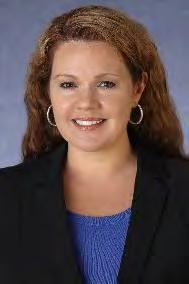
initial guidelines by July 1, 2023, review data every year thereafter, and revise the guidelines as necessary.
HB 345 required the Department of Corrections make reasonable accommod ations for the provision of midwifery or doula services for women who are in the Department’s custody at Levels IV or V and pregnant or have given birth within the past six weeks.
As you can see, even a small sampling of the General Assembly’s work covers a lot of ground. Still, there’s much work for the 152nd General Assembly to do. Look for an update next January and, in the meantime, if you have any questions, please contact me at holly.vaughn_ wagner@delaware.gov.
1. The Division of Research is one of two offices under Legislative Council of the General Assembly. The Division serves as a nonpartisan and confidential reference bureau for the General Assembly, providing a wide range of services, including legislative and legal research, bill drafting, and committee staffing, as well as the development, production, and distribution of public information concerning the General Assembly.
2. This article was not possible without the great –both “excellent” and “voluminous” – work of the Division of Research’s research analyst, Benjamin V. Kowal, and legislative librarian, Joel Rudnick. Many thanks to Ben and Joel for sharing their skills and data. Their research, of which this article is merely a small fraction, is the basis of a more thorough analysis of the legislation passed by the 151st General Assembly and is expected to be published in 2023.
3. Unless specified otherwise, the legislation listed in this article have been enacted into law, but some bills that were not enacted are included because the subject matter is at the front of legislative discussions on national and state levels.
4. These summaries over-simplify the complexities of the law regarding firearms and should be viewed as a starting point to learn about the changes in law passed by the 151st General Assembly.
 By Jim VandelHei, Mike Allen, and Roy Schwartz Workman Pub. Co., 2022
By Jim VandelHei, Mike Allen, and Roy Schwartz Workman Pub. Co., 2022
ever in the history of humanity have we vomited more words in more places with more velocity.” So begin Messrs. Jim VandelHei, Mike Allen, and Roy Schwartz (the cofounders of the Axios internet news company/website) in their highly entertaining, educational, and thoughtful book, Smart Brevity: The Power Of Saying More With Less. It was tempting to simply write “read this book” for my review of it, but while such statement is certainly my advice, it would be “smart-alecky” and not “smart brevity.”
So, what is “smart brevity?” In its pure form, “smart brevity” is a distinct, fourpart structure and approach: (i) a muscular “tease,” in the headline or subject line (or, perhaps in a brief, the point heading); (ii) a strong opening first sentence (the “lede”) that tells the reader something they don’t know or would want to know; (iii) a brief description of “why it matters,” and (iv) finally, the detail and support for the topic (or, what the authors term, the choice to “go deeper”).
In a world of hundreds of emails a day, and dozens of letters, memos and papers, a writer doesn’t have much time to engage readers. If the subject line to an email isn’t interesting or doesn’t otherwise demand attention, the email may not even be opened. If opened, the recipient may very well stop reading after the first sentence unless the sentence is interesting enough to keep the reader reading. The old adage that “you only get one chance to make a first impression” applies to every email, every story, every memo, every brief, and every speech. A bad start, or a boring introduction, and your reader or listener may move on or tune you out.
To a certain extent, of course, this is journalism 101. Budding journalists are taught that the opening sentence to every story needs to include the famous 5 W’s and 1 H (who, what, where, when, why and how). That way, readers can get a quick sense of the story and decide for themselves whether or not to keep reading. And, to the extent you want your readers to remember something, it needs to be in the first sentence. Bury the “lede,” and there’s a good chance many readers will never get to it.
Smart Brevity is simply brimming with good advice and aphorisms that never go out of style and are always worth reading. Stop using too many words. Stop using fancy (“ten dollar bill”) words. Don’t use “business speak.” Cut adverbs, weak words, and extraneous words. Don’t clutter your writing with anecdotes and don’t show off. Be simple. And direct. And don’t beat around the bush get to the point.
The authors provide lots of examples where they have taken clunky writing and turned it into “smart brevity.” “Do a lot more with a lot less” becomes simply “do more with less.” The subject line to an email that reads “Staff update to share with you when you are free…” becomes “Our chief of staff quit.” The long, rambling first sentence to an email that, ultimately, is seeking assistance becomes “I need your help,” rather than “I hope everything is going well. I recently had to make some changes to the project I’m working on and it’s becoming increasingly difficult to stay on track.

If you have the time and are so inclined, I could use your assistance.”
There are lots of books about writing. Smart Brevity practices what it preaches. It provides lots of helpful information and tips in short, easy to digest, bites. And it has an ear for memorable phrases.
Early on in their book, VandelHei, Allen, and Schwartz quote Mark Twain, who once wrote a friend, “I didn’t have time to write you a short letter, so I wrote you a long one instead.” Chancellor Quillen once expressed the same sentiment when writing an opinion in an expedited matter: “I regret that time has not permitted needed editing and that this opinion is therefore longer than desirable.” Gimbel v. Signal Companies, 316 A.2d 599, 601 (Del. Ch. 1974). The authors, Twain, and Quillen are all correct — brevity is better.
Ultimately, “smart brevity” is about breaking through the noise and clutter that is the modern life, full of texts, emails, twitter, internet web sites, podcasts, hundreds of cable channels, and countless other sources of information that, paradoxically, have lessened our attention spans and made it harder to absorb and retain information. Hanging on the wall of the Axios lunchroom is a simple sign with a simple message: “Brevity is confidence. Length is fear.” Read this book.
Richard “Shark” Forsten is a Partner with Saul Ewing Arnstein & Lehr LLP, where he practices in the areas of commercial real estate, land use, business transactions, and related litigation. He can be reached at Richard.Forsten@saul.com.

Smart Brevity practices what it preaches. It provides lots of helpful information and tips in short, easy to digest, bites.
Some of my themes from Januarys past include New Year’s food resolutions and comforting dishes for wintry weather. This January, I searched for inspiration using a little word association:
2023 > DSBA centenary > anniversary > wedding > WEDDING SOUP!
Yes, even though wedding soup is not served at Italian weddings, my word association led me to this recipe that has been part of my family’s winter repertoire for generations.

There are many variations to the wedding soup recipes I have seen over the years when comparing notes with other Italian-American home cooks (like my husband, Vincent) and perusing Italian cookbooks. Some call for making chicken broth from scratch and reserving the chicken for another meal. Others incorporate shredded chicken into the soup. For simplicity’s sake, and to let the meatballs take center stage, I use my frozen homemade broth or a store-bought chicken broth.
Bring the chicken broth to a boil. In a large mixing bowl, combine the meatball ingredients together using your hands. Roll small
For the broth:
• 2 32-ounce cartons of chicken broth
• 16 ounces fresh spinach or 1 head fresh escarole
For the meatballs:
• 16 ounces ground pork
• 1 large or jumbo egg
• ½ cup fine breadcrumbs
• 3 tablespoons grated Parmesan cheese
• 2 tablespoons chopped parsley
• Sea salt to taste
• Fresh ground pepper to taste
meatballs about the size of red globe grapes and drop into the soup, turning the heat down to simmer. Cook the meatballs for five minutes, then add the spinach or escarole (leaves removed and torn into smaller pieces). My Mommom would use escarole, a staple green in Italian kitchens, and I would recommend it if available at your market. Let the greens cook in the broth until wilted and keep the soup on simmer until ready to enjoy.
If serving with rice, prepare the rice according to package instructions. Do not combine in the soup. Rather, place a few spoonfuls at the bottom of each bowl before ladling the soup. This keeps the rice firm, especially if you have leftovers.
My Mommom also made a “crouton” rather than rice for her soup. For this more traditional version, a simple egg omelet serves as the “crouton.” If you opt for this version, beat 6 extralarge or jumbo eggs, several tablespoons of grated Parmesan cheese, sea salt, and fresh ground pepper to taste. Heat several tablespoons of olive oil in a non-stick pan, 9 to 10 inches in diameter. Pour in the egg mixture and cook as you would an omelet, making sure the bottom is set. Then place a large plate over the pan, invert the omelet, and slide back into the pan to firm up the other side. Once the omelet is cooked, slide it onto a cutting board to cool. Then cut into ½-inch cubes. Top each bowl with several spoonfuls of “croutons.”
Serve with grated Parmesan cheese, crushed red pepper, and crusty bread. In the spirit of celebration, enjoy with a glass of Prosecco.
Wishing all of us at the Delaware Bar Cent’Anni!
Susan E. Poppiti is a mathematics educator and is pursuing qualifications in wine. Susan can be reached at spoppiti@hotmail.com.

The Delaware Legal Directory is the only comprehensive upto-date listing of all Delaware attorneys and judges. The Delaware Legal Directory also contains contact information for the Delaware Court System, Firm Administrators, and related offices frequently contacted by legal professionals.
The Online Legal Directory, available on the DSBA website, allows DSBA members to quickly access up-to-date information for all Delaware judges and attorneys through an easy-to-use online portal with robust search options.
Easily connect with your colleagues right from your mobile device. Always up-to-date, the Legal Directory App for DSBA members is a simple solution to search for Delaware judges and attorneys, and then email, call, or text right from the app. (Existing app users only.)
Still want a Printed Legal Directory ? DSBA Members, staff, and non-members may easily order a Printed Directory online through the DSBA website (for a fee) with multiple delivery options. The 2023 Printed Directory will be available in January!
DELAWARE DEPARTMENT OF JUSTICE currently has employment opportunities available for Deputy Attorney General positions in multiple divisions. For all opportunities and full job descriptions, please visit: https://attorneygeneral.delaware.gov/ executive/hr/career-opportunities/.
MG+M THE LAW FIRM is recruiting an Associate with 0-6 years of experience for our Wilmington, Delaware office. This associate will be working primarily on Delaware and national civil litigation, including commercial, general, and products liability litigation. Delaware bar license or pending admission is required. This is an excellent opportunity to join a nationally recognized and growing defense firm with opportunities to perform challenging legal work hands on and work directly with clients on day one. Candidates should have strong work ethic, writing ability, and organizational skills. MG+M offers an excellent benefits package with a hybrid work environment. Please email resume to wlarson@ m gmlaw.com.
THE CITY OF NEW CASTLE is accepting applications for the position of City Solicitor. Minimum five years admission to the Delaware Bar required. Municipal law experience preferred. Submit resumes to City Administrator, bbarthel@ newcastlecity.delaware.gov.
GROUP OF ASHBY & GEDDES, P.A. is seeking to expand its team with a Delaware-licensed attorney with 1 to 3 years of experience. Superior academic credentials and strong oral and written communication skills required. Must be a team player with an excellent work ethic. Interested candidates should email a resume, writing sample, and transcript to KTsaganos@ashbygeddes.com.
MARKS, O’NEILL, O’BRIEN, DOHERTY & KELLY, P.C., a regional insurance defense firm, is looking for smart, hardworking Delaware attorneys of all experience levels who: 1) want to have the opportunity to work directly with clients; 2) are interested in taking depositions, arguing motions and defending clients at trial; and 3) believe they have the ability to handle matters independently either now or in the future. Candidates do not need to bring clients with them or develop clients (although those efforts have firm support.) What are you waiting for? Get started on your next career move. We have a hybrid home/office work culture, competitive salary and benefits. Candidates should email: ddoherty@moodklaw. c om. We are an Equal Opportunity Employer.
FAMILY COURT LITIGATION PRACTICE seeks Delaware Attorney: To represent clients in Court, to assist with motion practice, discovery, research and case management. The ideal candidate possesses a demonstrated interest in Family Court work, litigation experience, good people skills and empathy for clients. We pride ourselves in work ethic, fairness, communication and respect. Training and guidance provided. Part-time or flexible schedule possible. A great opportunity for the right candidate. Please send resume and cover letter including relevant experience to george@ t sakataraslaw.com.
Please check our website for details about the positions. http://www.declasi.org/ employment/.
SMALL FIRM HIRING: Wilmington Firm seeking full or part time Attorney interested in General Practice with emphasis on Family Law. Opportunity for partnership within three years. Flexible hours. Contact David JJ Facciolo, Esq. djjf4law@aol.com. (302) 777-2201.
SMITH, KATZENSTEIN & JENKINS LLP seeks an associate with 0-5 years of experience to work in our IP, complex commercial, and corporate litigation practices. Delaware Bar admission (or pending) required. We are looking to add a team member with strong writing and advocacy skills. We offer a competitive salary and benefits and a collegial work environment. Interested applicants should send résumé, along with a writing sample, to info@skjlaw.com.
ESTABLISHED LAW FIRM with multiple offices seeks an attorney to join our busy firm. Candidates should be self-motivated, hard-working, and interested in having direct contact with clients, with experience in civil litigation and personal injury. Portable business is a plus, but not a requirement. Send cover letter and resume to lajordan@3200law.com.
LAWYERS’ ROW SUITE: 16’X9’ Furnished Office with 11’X7’ Window Plus 8’X7’ Workstation Plus Shared Access to Conference Room (14’X12’), Kitchen, and Reception Area; $900; (302) 888-1275.
OFFICE FOR RENT in a beautiful historic building. Shared services and facilities include conference and large reception area. Some furniture available. Reasonable rent. Excellent opportunity to open a new practice or continue a small practice in a collegial atmosphere. Call Bayard Marin (302) 658-4200.
DSBA strives to find the best instructors and topics to meet your mandatory CLE requirements. We offer almost all of our seminars online so you can watch from work or home. Discounted savings are offered to DSBA Members on all seminars including Arbitration and Mediation Certification programs.
DSBA’s sections are some of the most active and prestigious groups in the legal profession. Lawmakers frequently ask sections for input in drafting legislation. The entire weight of the Bar can be shifted to support or oppose the very laws which affect your practice. Be a part of the process!








The Online Legal Directory allows members to quickly access up-to-date information for all Delaware judges and attorneys through an easy-touse online portal with robust search options.
Need an easy way to find an attorney? Download the app to your smartphone. This practical Bar Directory is easy to use and free for all DSBA members.
The lifeline of a lawyer is the network and every event, CLE, committee, or meeting helps you build that network.
The Bar Journal and the Delaware Law Review have provided important articles on the law and ethics to our members for decades.

Whether you are an experienced attorney or one just starting out, having access to another lawyer in your field is priceless.
Being a part of DSBA gets you a powerful voice for passing or opposing laws that affect your business.
Get help through the Law Office Management Assistance Program and committees like the Professional Guidance Committee, the Lawyer’s Assistance Committee, and The Lawyers’ Assistance Program (DE-LAP).

“Carol was our first professional executive director of DE-LAP and she built the program practically from scratch. She has helped so many lawyers navigate choppy waters with both expertise and compassion. We are so grateful to Carol for her stewardship and building such a strong program. We will really miss her enthusiasm and humor!”
1
Karen Ann Jacobs, Esquire Co-Chair of the Professional Guidance Committee2“Carol has saved many careers, and probably some lives, of Delaware attorneys. She started our Lawyer Assistance Program and then built it into a highly effective and nationally recognized program that not only assists lawyers struggling with substance abuse and other mental health issues, but also provides a variety of opportunities for all Delaware lawyers to improve their resiliency and wellbeing. She led policy changes to improve the lives of lawyers. She also was exceptional at counseling and caring for individual lawyers. No problem was too big or too small for Carol. We will miss her greatly and wish her all the best that life has to offer.”
R. Judson Scaggs, Jr., Esquire Co-Chair of the Lawyers Assistance Committee“As the liaison Justice assigned to DE-LAP, I have had the tremendous privilege of working with Carol who has served as the director of DE-LAP for over sixteen years. Her boundless enthusiasm to help those in our Bar in need of confidential assistance will be sorely missed. We wish her the best in the next chapter of her life.”
The Honorable Karen L. Valihura, Judicial Liaison to DE-LAP

“DE-LAP and DSBA are partners. While one of us deals with the day to day matters of providing education and opportunities to connect, the other is focused on the overall well-being of the member. It is a symbiotic relationship that works and Carol has been a tremendous collaborator in making sure our members are happier, safer, and better-informed. I will truly miss her.”
DSBA
Executive Director“I have had the pleasure of working with Carol since I came on the Bench in April 14, 2010. Bottomline — Carol saved lives during her tenure with DE-LAP. Carol is an angel. She perfectly blends empathy with a keen appreciation of what needed to be done with everyone seeking her aid. I will miss her.”
The Honorable Eric M. Davis“I cannot express in words my appreciation and amazement for the work Carol has done at DE-LAP. Over a decade ago, Carol took a modest concept and built it into an ambitious model program. While the Delaware legal community, and I personally, will miss Carol’s guidance and wisdom on matters of wellness that affect us all, we take comfort in knowing that her successor will be taking over a solid mature operation.”
“Carol is an inspiring and outstanding leader and advocate for the mental health of the legal profession. It’s been a privilege working with her. I wish her all the best in her retirement.”
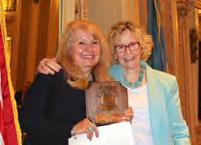
Rich Lombino, Esquire, LCSW, Lombino Counseling LLC

“Carol has been tirelessly dedicated to improving the mental wellbeing of those in the legal community. She has been a leader in providing education and expanding resources to help reduce suffering in legal professionals throughout Delaware.”
Dr. Sarah Falgowski, M.D., Delaware Psychiatry and Wellness
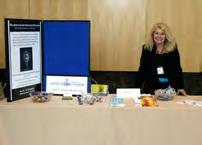
“Carol is an extraordinary person. She has so much heart for those she works with — both her lawyer clients and her colleagues! We will miss her terribly!”
Alice R. O’Brien, MS, NCC, LPCMH, Counseling at Sussex Cottage
“I’m not sure where I would be without Carol. Carol has been a source of consistent, non-judgmental support for me and for many Delaware lawyers. She built DE-LAP from the ground up into a strong support system for the Bar. I’ll miss her. I wish her the best in her retirement.”
Dan SimmonsThe Delaware State Bar Association Insurance Program, advised and administered by USI Affinity, offers a proprietary, comprehensive Lawyers’ Professional Liability program. Along with other business insurances to attorneys and law firms in Delaware.
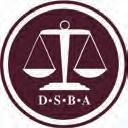
As a leading insurance broker for Lawyers’ Professional Liability, USI Affinity has been protecting Lawyers for over 50 years. We understand the business and the risks that attorneys and law firms face every day.

The DSBA Insurance Program Lawyers Professional Policy offers proprietary savings and coverages specifically designed to mitigate risk and close gaps in coverage.
Directors & Officers Liability insurance protects the past, present, and future directors and officers of a law firm from losses arising from “wrongful acts”.
EPLI coverage can be specifically designed to help protect the personal assets of a privately owned firm’s directors and officers, as well as the financial well being of the firm itself.